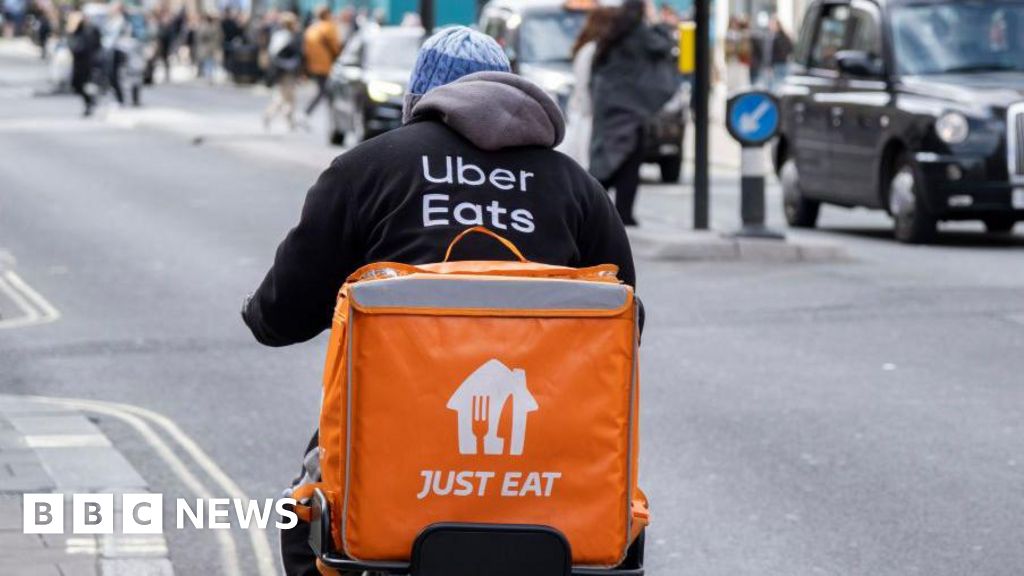Deliveroo, Uber Eats and Just Eat have agree to "strengthen" security checks following reports some asylum seekers are working illegally as couriers. The food delivery companies agreed to increase facial verification and fraud checks in a bid to stop people with no right to work in the UK from using someone else's account to earn money illegally. Asylum seekers are not allowed to work for the first 12 months of being in the UK, or until their asylum application is approved. But concerns have been raised that some migrants staying in government asylum hotels have been earning money on the apps. The government said there was "illicit account sharing" enabling people to work for the firms illegally. It said Deliveroo, Uber Eats and Just Eat had now agreed to "increase the use of facial verification checks and fraud detection technology" to ensure only registered account holders could work off their platforms. Deliveroo and Uber Eats will increase the quantity and sophistication of verification checks they do already, and Just Eat will carry out checks on a daily rather than monthly basis. The government said the new checks would come into force over the next 90 days. "This government will not turn a blind eye to illegal working," said Dame Angela Eagle, minister for border security and asylum. "It undercuts honest business, hits people's wages and plays into the hands of the people smuggling gangs." Over the last year, Deliveroo, Uber Eats, and Just Eat have introduced voluntary right-to-work checks on all account holders and registered so-called "substitute" drivers, but ministers have raised concerns that there continued to be abuse in the sector. Last week, The Sun newspaper reported that Channel migrants were able to rent out other people's Deliveroo and Just Eat delivery accounts via social media groups. It claimed asylum seekers had been earning up to £1,000 a week on the apps and found dozens of online forums where legal riders were sub-letting their accounts for as little as £40 a week. Ministers met with the three firms on Monday following the reports. A Deliveroo spokesperson said the company took a "zero tolerance approach to anyone abusing our platform" and said it was "committed to further strengthening our approach, increasing daily facial recognition checks". Uber Eats said it would "continue to invest in industry-leading tools to detect illegal work and remove fraudulent accounts", while Just Eat added it was "continuing to invest significant resources to protect the integrity of our network". In March, the government announced that companies hiring people in the gig economy would be legally required to carry out checks, confirming that anyone working in their name is eligible to work in the UK, bringing them in line with other employers. If businesses fail to carry out such checks, they could face hefty penalties, including fines of up to £60,000 per worker, business closures, director disqualifications and potential prison sentences of up to five years.
Food delivery apps to tighten checks to stop illegal workers
TruthLens AI Suggested Headline:
"Food Delivery Companies Enhance Security Measures to Prevent Illegal Work by Asylum Seekers"
TruthLens AI Summary
In response to growing concerns about illegal working among asylum seekers, major food delivery apps Deliveroo, Uber Eats, and Just Eat have committed to enhancing their security measures. Reports have surfaced indicating that some asylum seekers are utilizing these platforms to work illegally, often by sharing accounts with individuals who have the right to work. Asylum seekers are prohibited from working in the UK during their first year or until their applications are approved, yet there are indications that some migrants residing in government asylum hotels have been able to earn income through these delivery services. The UK government has identified instances of 'illicit account sharing' and is urging these companies to take stronger action against such practices. Consequently, the delivery firms have agreed to increase the use of facial verification and fraud detection technologies to ensure that only legitimate account holders are permitted to operate on their platforms. Deliveroo and Uber Eats plan to enhance their existing verification processes, while Just Eat will transition to conducting daily checks instead of monthly ones, with the new measures expected to be implemented within the next 90 days.
The government, represented by Dame Angela Eagle, Minister for Border Security and Asylum, has emphasized the importance of addressing illegal working, stating that it undermines legitimate businesses and contributes to wage suppression. Reports have suggested that some asylum seekers have been able to generate significant income through these apps, with claims of earnings reaching up to £1,000 a week. Investigations have revealed online forums where individuals are renting out their delivery accounts for as little as £40 a week. Following these revelations, the government held discussions with the three food delivery companies to reinforce compliance with right-to-work regulations. As of March, it was announced that gig economy employers would be legally required to perform eligibility checks on their workers, aligning them with traditional employment standards. Failure to comply with these regulations could result in severe penalties, including substantial fines and potential prison sentences for non-compliance.
TruthLens AI Analysis
You need to be a member to generate the AI analysis for this article.
Log In to Generate AnalysisNot a member yet? Register for free.
